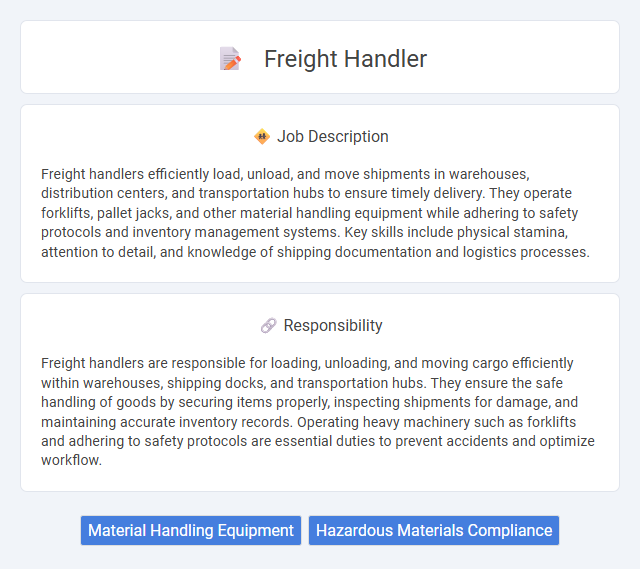
Freight handlers efficiently load, unload, and move shipments in warehouses, distribution centers, and transportation hubs to ensure timely delivery. They operate forklifts, pallet jacks, and other material handling equipment while adhering to safety protocols and inventory management systems. Key skills include physical stamina, attention to detail, and knowledge of shipping documentation and logistics processes.
Freight handler jobs often require physical strength, stamina, and the ability to work in fast-paced environments, which may suit individuals with good health and strong endurance. People who are comfortable with manual labor and can handle repetitive tasks under varying weather conditions likely have a higher probability of success in this role. Those with physical limitations or a preference for sedentary work might find this job less compatible with their capabilities.
Qualification
Freight handlers must possess physical stamina and strength to lift heavy packages and operate loading equipment efficiently. Key qualifications include a high school diploma or GED, along with hands-on experience in warehouse operations or logistics. Certifications such as OSHA safety training or forklift operation further enhance job readiness and compliance with industry standards.
Responsibility
Freight handlers are responsible for loading, unloading, and moving cargo efficiently within warehouses, shipping docks, and transportation hubs. They ensure the safe handling of goods by securing items properly, inspecting shipments for damage, and maintaining accurate inventory records. Operating heavy machinery such as forklifts and adhering to safety protocols are essential duties to prevent accidents and optimize workflow.
Benefit
Freight handler jobs likely offer benefits such as competitive wages and overtime pay due to the physically demanding nature of the work. Employees may have access to health insurance, retirement plans, and paid time off, depending on the employer's policies. Opportunities for skill development and career advancement could also be common in this role, enhancing long-term job satisfaction.
Challenge
The freight handler job likely involves physically demanding tasks that require strength, endurance, and careful attention to safety protocols. Workers may often face tight deadlines and unpredictable schedules, increasing job stress and risk of injury. The role probably demands adaptability to handle various cargo types and operate different equipment efficiently under pressure.
Career Advancement
Freight handlers play a critical role in logistics by loading, unloading, and organizing shipments efficiently within warehouses and transportation hubs. Career advancement opportunities include progressing to supervisory roles such as shift supervisor or warehouse manager, where leadership and operational planning skills are essential. Gaining certifications in forklift operation, safety compliance, and supply chain management can significantly enhance promotion prospects and increase earning potential.
Key Terms
Material Handling Equipment
Freight handlers operate various types of Material Handling Equipment (MHE) such as forklifts, pallet jacks, and conveyors to efficiently move, load, and unload goods in warehouses and distribution centers. Mastery of equipment safety protocols and maintenance ensures the protection of both merchandise and personnel while optimizing operational workflow. Proficiency in using MHE significantly enhances productivity and reduces manual labor, making freight handling tasks more efficient and reliable.
Hazardous Materials Compliance
Freight handlers play a crucial role in ensuring Hazardous Materials (HAZMAT) compliance by carefully identifying, labeling, and segregating dangerous goods according to local and international regulations such as OSHA, DOT, and IMDG codes. Proper training in handling, storage, and transportation of hazardous materials minimizes the risk of accidents, environmental damage, and regulatory penalties. Effective communication and documentation are essential for maintaining safety standards and ensuring smooth logistics operations in freight management.
 kuljobs.com
kuljobs.com